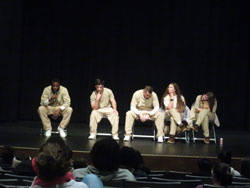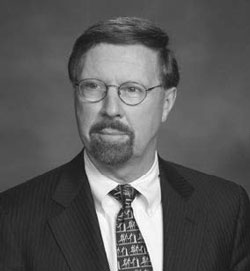Project P.R.I.D.E. (Promoting Responsibility in Drug Education) came to the University’s Pollak Theatre for its 10th year, warning the community that poor choices can cause even worse outcomes, on Dec. 1.
“I was supposed to be a marine biologist training dolphins, not be in a prison,” said Crystal, an inmate who spoke at the Project P.R.I.D.E. presentation.
The Project P.R.I.D.E program travels up and down New Jersey three times a week to spread their message. Five minimum-custody offenders from Edna Mahan Correctional Facility and Mountainview Correctional Facility each shared their stories, recounting how their poor choices led them to prison. The speakers all shared how they ended up in jail, and warned the audience on how their past hopes and dreams have been shattered thanks to their prison sentence.
There was a sign on the stage that read, “The worst thing you can do is establish a criminal record.” Michael Ritter, Project P.R.I.D.E.’s coordinator for the New Jersey Department of Corrections, said a criminal record is, “like a big grey cloud, it will never go away.”
The speakers all looked like an average person you could see on campus. One inmate, Sam, is only 20 years old. He was sentenced to five years in prison when he was 17 for causing a fatal collision. Before his accident, Sam’s life was full of potential. He came from a wealthy family, was a star lacrosse player, was in the National Honor Society, and had a full scholarship to a major university.
Unfortunately, Sam adopted an unhealthy lifestyle involving alcohol. One night while driving home after drinking at a party, Sam had collided with an oncoming vehicle while he was texting. The other driver had died on impact. “I have no idea how to describe to guys the emotions you feel when you find out you took someone’s life.”
Another speaker, Crystal, of Brick, N.J., is serving six years for killing a pedestrian while driving under the influence of drugs. Crystal said she came across a quote recently that she related to. She said, “When bad things happen to you, you can allow it to do one of three things; One: you can allow it to define you. Two: you can allow it to destroy. Or three: Allow it to strengthen you.” She said that she allowed her problems to define her, and ultimately destroy her.
Crystal had faced many traumas in her life such as her parents divorce, her best friend’s murder, and being sexual assault. Crystal said she had to raise herself and her younger sister, and grew up with the mindset that she had to take care of herself. She turned to drugs and never dealt with the emotions that were consuming her. Instead of choosing to get help, she chose substance abuse.
Crystal stressed that if you have issues, you have the choice to deal with them. She said, “You’re not weak if you ask for help. It’s really ironic that today, I’m physically incarcerated, but for the first time in forever, I’m mentally free. That’s only because I chose to deal with my issues at hand.” By the time she realized she needed help, however, she was in a prison cell. Crystal wants her listeners to realize this before it’s too late.
The other speakers, Summer, Connor, and Shakir all followed with a similar sentiment: your life can change in an instant, so control your life and make the right choices. “It’s not worth it, I can promise you guys,” said Shakir, who was charged with unlawful possession of firearms.
Brennan Lanni, a senior criminal justice major, felt the presentation was very eye opening. “The presentation provided a more human perspective on correctional facilities. Instead of looking at numbers, it shows on a personal level how prison affects inmates.”
Suanne Schaad Substance Abuse Coordinator at the Office of Substance Awareness, first invited Project P.R.I.D.E. to Monmouth University 10 years ago through Michael Ritter. Ritter had been with the program since 1999, and was the moderator for the presentation.
The program has become very popular, and is a community event. High schools, local programs, and the public have been invited to attend the presentation.
“I think it’s a great peer-to-peer message. As we’ve seen, they (the inmates) are young people who have sat in the seats that our college students have sat in today, and made a choice. I think it’s just easy, relatable situations that I hope our students take a message from,” said Schaad.
The inmates who speak at the presentation are chosen from a pool of about 10 to 11 inmates, according to Ritter. The speakers do not get anything for participating, such as time off their sentence. Right after the presentation, they are sent back to their facility.
Ritter said, “to participate in Project P.R.I.D.E you have to, number one, volunteer. Number two, you have to go through a very thorough evaluation process, and number three, you have to be almost at the point where you’re getting ready to go home or to a half-way house.”
The program not only benefits the audience, but it benefits the speakers too. Ritter said, “I’ve been told many, many, many times by our presenters that, ‘This really helped me turn my life around because in the first time in a long time, I can do something positive, and turn a very terrible, tragic situation into something somewhat positive, to help others.’”
Summer, who was sentenced to 10 years and is currently serving her 8th year for drug related charges, graduated college the day before in the facility. Even though she is in jail, Summer feels she is taking steps to get her life back on track once her sentence is over. She said, “It doesn’t matter where you are or what you’re going through. If you have faith in yourself, you can rise above anything. I’m proof right now.”
Ritter ended the program by inviting the audience to speak with the inmates after the presentation, to speak to him or the officers accompanying him for information on how to volunteer at the prisons to help the inmates earn their GEDs, or get information on internships. If interested in volunteering, call Ritter at 609-292-4036 ex 5325
Schaad encourages students seeking help with substance abuse to visit the Office of Substance Awareness at the Health Center. She said, “It’s totally confidential, and it’s free, I work with students at all different ranges; if you’re simply contemplating, changing a use, cutting down, or you know you want to stop, come check it out, even one or two sessions. It can’t hurt.”
The event was cosponsored by HERO Campaign for Designated Drivers, Greek Senate, Alpha Kappa Alpha Sorority, Inc., Alpha Kappa Psi Business Fraternity, Alpha Omicron Pi, Alpha Sigma Tau, Alpha Xi Delta, Delta Phi Epsilon, Delta Tau Delta, Lambda Theta Alpha Latin Sorority Inc., Lambda Theta Phi Latin Fraternity, Inc., Phi Kappa Psi, Phi Sigma Sigma, Sigma Pi, Sigma Tau Gamma, Tau Delta Phi, Tau Kappa Epsilon, Theta Xi, Zeta Tau Alpha, Office of Substance Awareness, and Students in Recovery.
PHOTO TAKEN by Kiera Lanni



